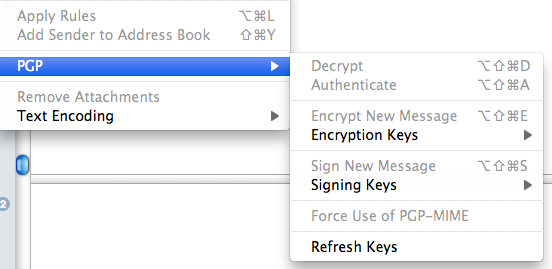

Our developers at Townsend Security have worked hard to adapt PGP to these platforms without impacting the implementation of OpenPGP. You might wonder how easy it is to use PGP on these platforms.
#Pgp command line for mac windows
The IBM Enterprise servers are quite different than their Windows and Linux operating system cousins. In this respect we are standing on the shoulders of those original giants of the PGP world who brought us PGP and who regularly performed NIST FIPS 140-2 validation. We also perform the cryptographic test suite defined by the National Institute of Standards and Technology (NIST) to insure that our implementation of PGP Command Line meets all of the relevant encryption standards. Here at Townsend Security we test our implementation against a variety of open source and commercial versions. Since there is no independent certification authority for PGP it is up to the open source and commercial vendors to perform interoperability testing. Interoperability testing is crucial to avoid implementation errors. The OpenPGP standard is reasonably complex and it is easy to inadvertently introduce incompatibilities. The open source and commercial versions mentioned above do implement support for the OpenPGP standards. The OpenPGP standard assures customers that encrypted files can be processed by any application that supports that standard. Other commercial versions are provided by Viacrypt and SDS and are supported by those companies. We’ve been supporting PGP on the IBM platforms for more than a decade. Here at Townsend Security our relationship with Symantec allows us to bring the commercial version of PGP to IBM Enterprise platforms IBM i and IBM System z. While GNU Privacy Guard is actively maintained, other open source implementations may not receive as much on-going attention from developers.īecause of its history with the original developers of the PGP, the most common commercial version of PGP is provided by Symantec.
#Pgp command line for mac portable
Other open source implementations include Bouncy Castle, the International PGP organization, Portable PGP, and others. GNU has a large community of developers who support this application and it is readily available. It is available on several operating system platforms including Windows, Linux, and Unix. Probably the most well known is the GNU Privacy Guard, or GPG, application. In the open source world there are several solutions that implement the OpenPGP message format and conform to the RFC standards. That’s important because we want our PGP encrypted information to be supported by the largest number of platforms and vendors. We have a standard for PGP, so now we need to identify which applications implement the standard.

They do not define an application, and the term OpenPGP does not refer to any actual application or solution. These Internet RFCs define the format and behavior for any application that claims to support the OpenPGP standard. The standards are referred to as the OpenPGP standard. Let’s dive into this a bit deeper.īefore we jump into a discussion of solutions and their compatibility, it’s important to know about the Internet standards for PGP. Our customers often have questions about PGP compatibility with open source implementations like Gnu Privacy Guard, or GPG. In partnership with PGP Corporation, McAfee and now Symantec, we’ve implemented PGP Command Line on both the IBM i (iSeries, AS/400) and on the IBM System z Mainframe. Pretty Good Privacy (PGP) is a mature and well-regarded whole file encryption application.


 0 kommentar(er)
0 kommentar(er)
